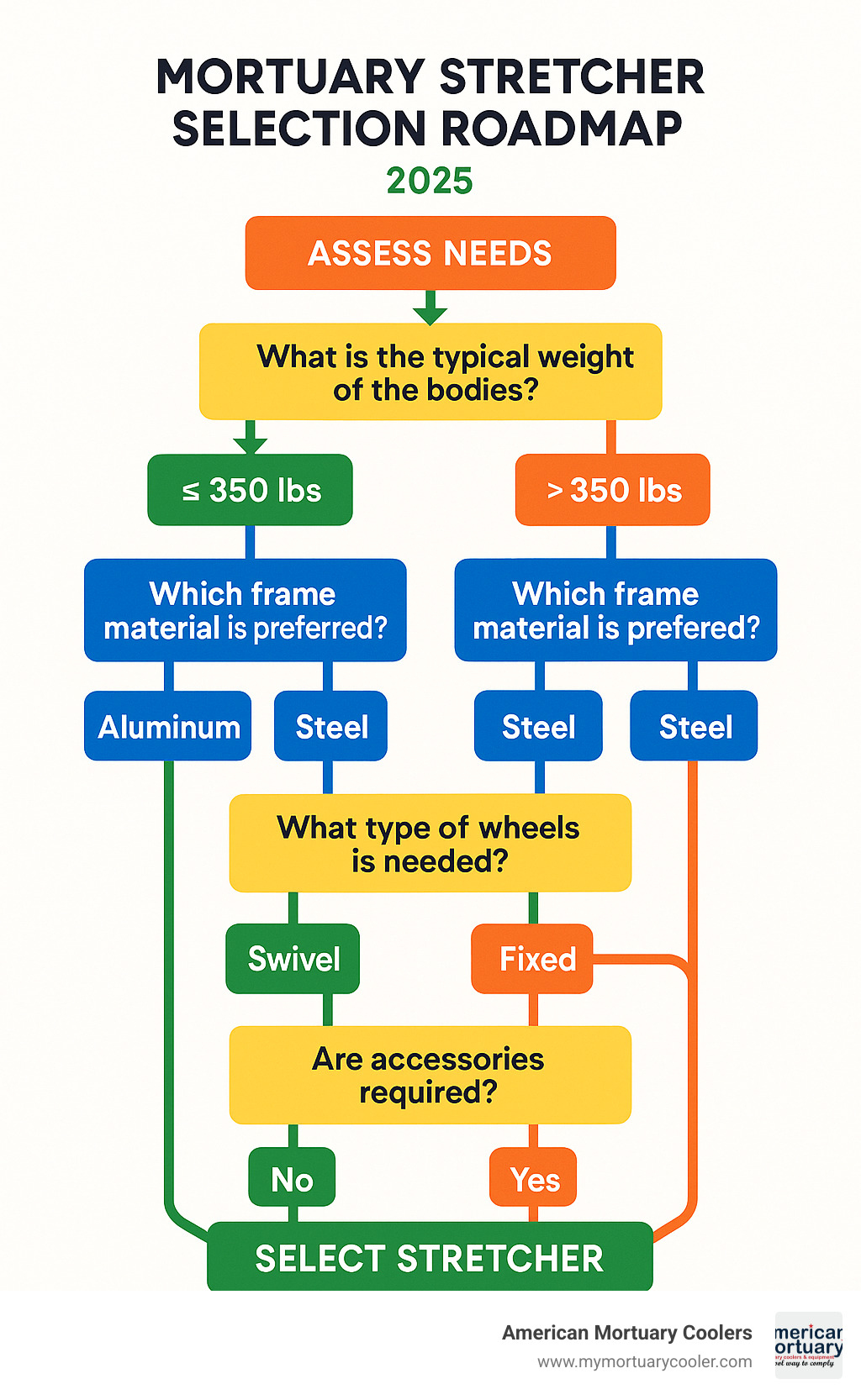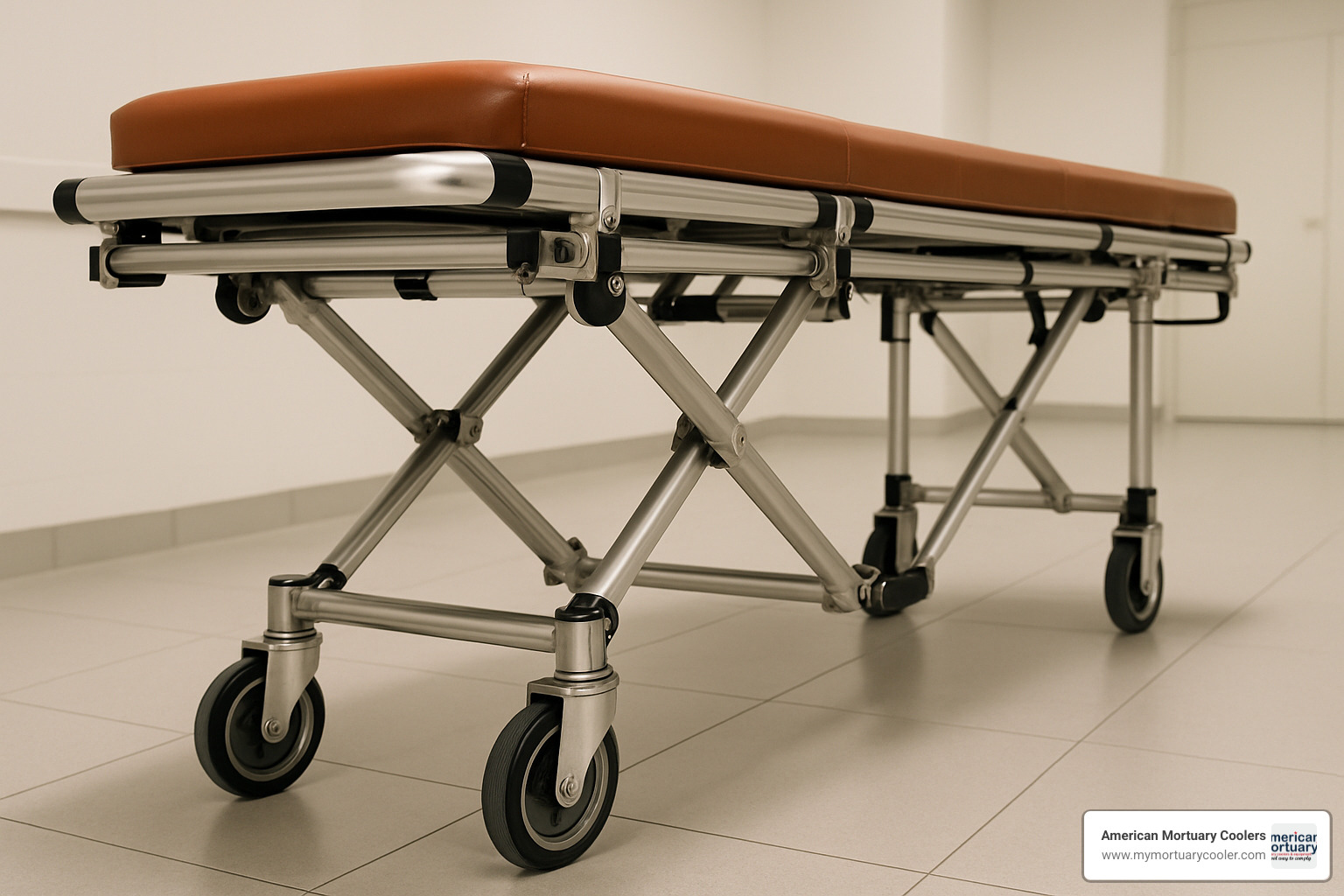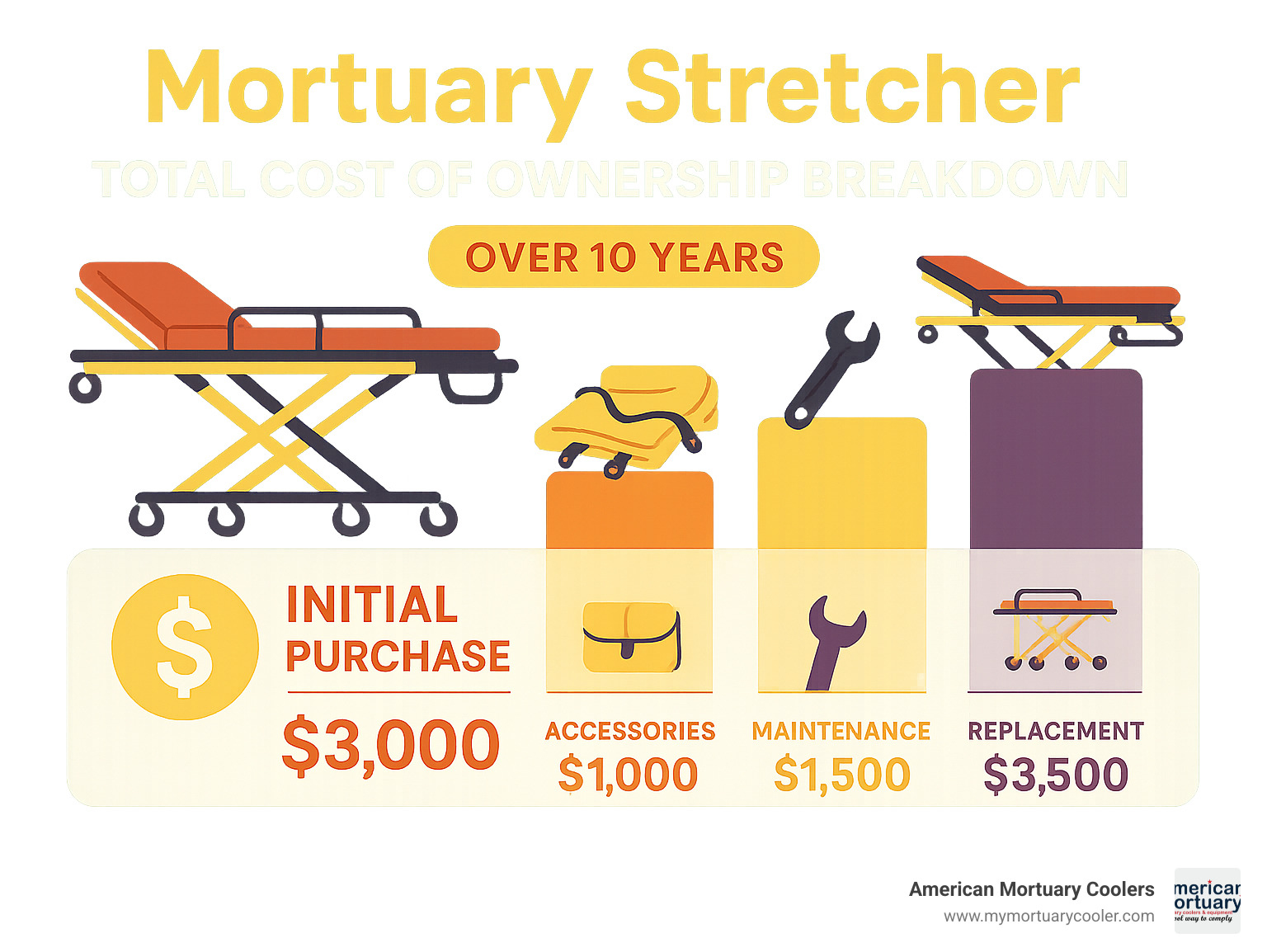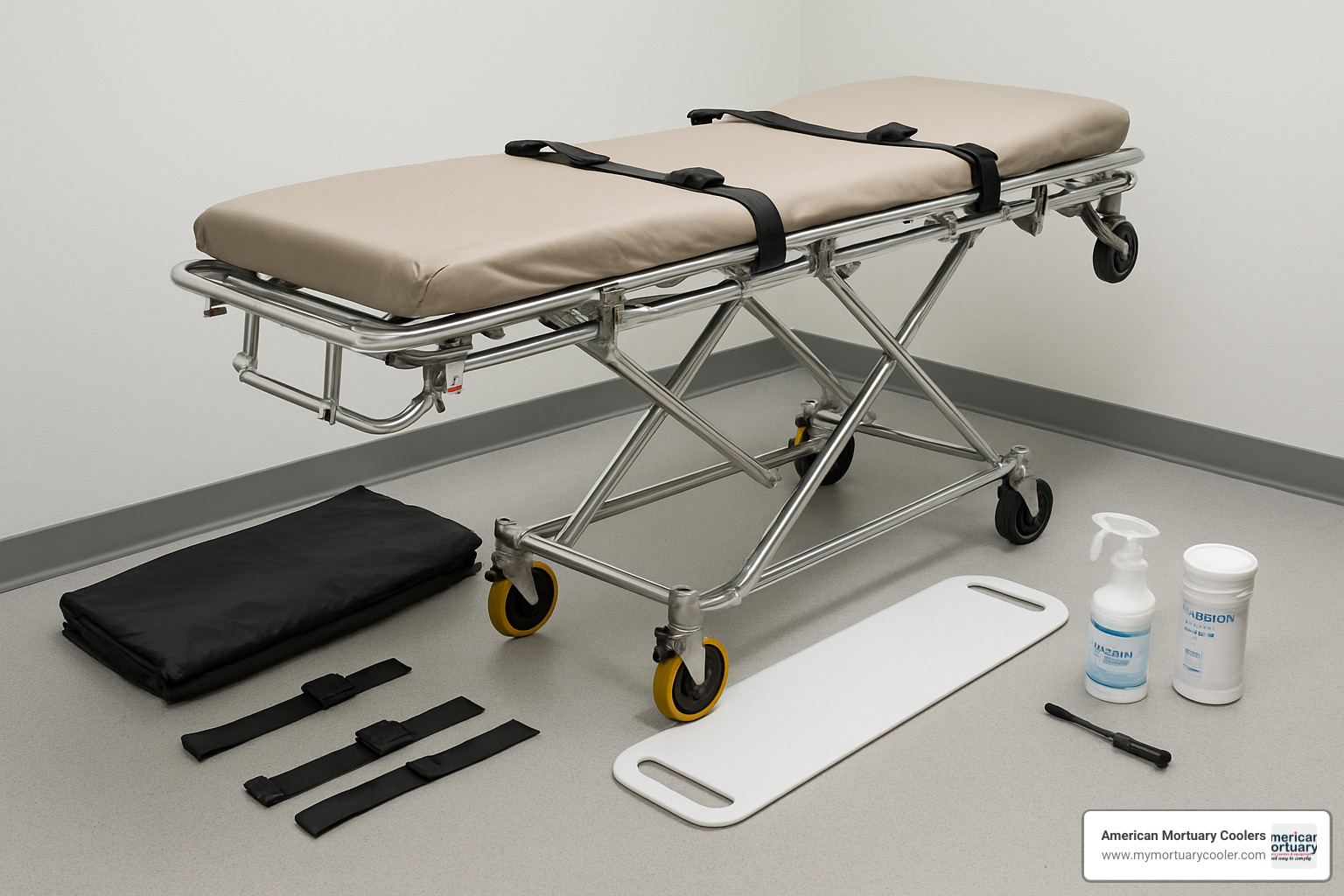Why Choosing the Right Mortuary Stretcher is Critical for Your Funeral Home
A mortuary-stretcher is a specialized wheeled cot designed for the safe transport and handling of deceased individuals in funeral homes, hospitals, and coroner offices. Here's what you need to know:
Key Features:
- Weight capacity: 350-1000+ lbs depending on model
- Height adjustment: 6 levels for easy loading/unloading
- Materials: Anodized aluminum or stainless steel frames
- Operation: Single-person handling capability
- Wheels: Swivel wheels with locking brakes
Main Types:
- Multi-level stretchers (most popular)
- Folding/portable models
- Bariatric stretchers (1000+ lbs capacity)
- High-loading stretchers for tall vehicles
The mortuary stretcher you choose directly impacts your staff's safety, operational efficiency, and ability to provide dignified service to families. Unlike ambulance stretchers, mortuary stretchers feature multi-level height adjustment, reinforced undercarriages, and specialized materials like bacteriostatic vinyl covers.
One funeral director shared: "The mortuary stretcher is great! We already used it for transporting 450 pounds... was smooth and easy to operate."
With prices ranging from $1,095 to $4,399, selecting the right stretcher requires understanding load capacities, frame materials, wheel configurations, and accessories that match your specific needs.
As American Mortuary Coolers, a national mortuary equipment supplier, we've helped countless funeral homes select durable, American-made mortuary stretchers that streamline operations while meeting strict industry standards. Our experience shows that the right mortuary-stretcher choice can dramatically reduce staff injuries and improve workflow efficiency.

Handy mortuary-stretcher terms:
Understanding the mortuary-stretcher: Purpose and Basics
When you walk into any mortuary-stretcher showroom, you'll quickly realize these aren't your typical hospital stretchers. These specialized pieces of equipment are the workhorses of funeral homes, hospitals, and coroner offices across the country. They're built with one clear mission: safe removal and transport of deceased individuals while protecting your staff's backs and maintaining dignity throughout the process.
Think of a mortuary-stretcher as the bridge between compassionate care and practical efficiency. Whether you're responding to a removal call at 2 AM or carefully transporting someone through a crowded hospital corridor, the right stretcher makes all the difference in your daily workflow.
What is a mortuary-stretcher?
A mortuary-stretcher is engineered for one-person operation, which is a game-changer for smaller funeral homes or late-night removals. Unlike those bulky hospital stretchers that need a team to operate, these are designed so one trained professional can handle the entire process safely.
The load capacity is where mortuary stretchers really shine. We're talking about equipment that can handle anywhere from 350 pounds on standard models up to over 1,000 pounds for bariatric situations. That's serious engineering right there.
You might hear people use "trolley" and "cot" interchangeably, but there's actually a difference. A trolley typically has a fixed height, while a cot features those multi-level adjustment capabilities that make loading and unloading so much easier. Most modern funeral homes prefer cots because of their versatility.
How mortuary-stretchers differ from ambulance or hospital stretchers
The differences are remarkable once you know what to look for. Mortuary-stretchers feature an impressive height range - typically adjusting from around 9 inches all the way up to 32 inches. Compare that to ambulance stretchers, which have much more limited adjustment ranges since they're designed primarily for patient comfort during transport.
Those multi-level frames are the real standout feature. While ambulance stretchers focus on medical access and patient monitoring, mortuary stretchers prioritize loading efficiency and staff ergonomics. The frames automatically lock when you're unloading and fold smoothly when loading into vehicles - it's like having an extra pair of hands.
The undercarriage design tells the whole story. Mortuary stretchers have reinforced legs with heavy-duty locking mechanisms, wider wheel bases for stability, and often include built-in stair guides. The Ferno Model 11-T, for example, has a track system specifically for controlled stair navigation - something you'd never need on an ambulance stretcher but absolutely essential for removal work.
These stretchers also incorporate bacteriostatic materials and easy-clean surfaces, recognizing the unique sanitation requirements of mortuary work. It's this attention to industry-specific details that makes choosing the right mortuary-stretcher so important for your operation.
Key Features & Materials That Matter

When you're shopping for a mortuary-stretcher, it's the details that make the difference between a tool that helps your team and one that causes headaches. Let's break down what really matters.
Adjustable heights aren't just convenient - they're essential for protecting your staff's backs. The best stretchers offer multiple height settings that match everything from your mortuary tables to vehicle floors. No more dangerous lifting or awkward transfers.
Reinforced legs with automatic locking mechanisms give you peace of mind during every transfer. These legs lock automatically when you're unloading and fold smoothly when loading into vehicles. It's one less thing to worry about during already stressful moments.
Swivel wheels might seem basic, but quality matters here. Look for wheels that turn easily but lock securely. Cheap wheels that stick or brakes that fail aren't just annoying - they're dangerous.
For bariatric strength, you'll need more than just higher weight ratings. The entire frame needs reinforcement, and oversized wheels distribute weight better. It's engineering that you hope you won't need often, but when you do, you'll be grateful for it.
Material choices directly impact how long your stretcher lasts and how easy it is to maintain. Anodized aluminum strikes the perfect balance for most funeral homes - it resists corrosion while keeping the stretcher light enough for easy handling. A quality aluminum stretcher like the Ferno Model 11-T weighs just 24 pounds but supports 350 pounds.
Stainless steel construction offers maximum durability for high-volume operations. Yes, it's heavier and costs more upfront, but it practically lasts forever with minimal maintenance. Think of it as buying once instead of replacing every few years.
Vinyl mattresses with bacteriostatic properties aren't just about comfort - they actively resist microbial growth while being easy to clean and sanitize. The vinyl-coated nylon covers used on professional models combine durability with the hygiene requirements specific to mortuary work.
| Frame Material | Weight | Durability | Maintenance | Cost |
|---|---|---|---|---|
| Anodized Aluminum | Light | Good | Low | Moderate |
| Stainless Steel | Heavy | Excellent | Very Low | High |
| Standard Steel | Moderate | Fair | Moderate | Low |
Weight capacities and size options
Getting the weight capacity right isn't just about avoiding equipment failure - it's about protecting your team and maintaining dignity during every transfer.
Standard mortuary-stretchers typically handle 350-400 pounds, which covers most situations you'll encounter. The Ferno Model 24 Mortuary Cot is a perfect example - it supports 400 pounds while weighing just 54 pounds itself. That's a 7-to-1 strength-to-weight ratio that makes daily operations much easier.
Heavy-duty models like the MOBI F500 bump capacity up to 500-600 pounds. If you regularly handle larger individuals, this extra capacity provides a crucial safety margin. The Junkin HD Mortuary Cot pushes this even further to 650 pounds with reinforced construction throughout.
Bariatric stretchers represent the top tier, with models like the MOBI F1200 accommodating over 1,000 pounds. These aren't just scaled-up regular stretchers - they feature completely redesigned frames, oversized wheels, and improved stability systems. The engineering required for safe bariatric handling is substantial.
Size-wise, most stretchers measure 76-78 inches long and 19-21 inches wide when fully extended. But here's where folding models shine - the Ferno 11-T compresses to just 36.5 inches for storage while maintaining full functionality when deployed. That's a game-changer for facilities with limited space.
Certifications & industry standards every mortuary-stretcher must meet
Professional mortuary-stretchers must meet strict safety and quality standards that go far beyond basic functionality.
FDA certification ensures that materials and construction meet medical device requirements. This isn't just paperwork - it means the vinyl, metals, and other materials have been tested for safety and won't break down under normal use.
CE marking indicates European Conformity compliance, which matters even if you're not shipping overseas. These standards often exceed domestic requirements and signal higher quality manufacturing.
ISO 9001 certification demonstrates that the manufacturer follows consistent quality management systems. When you're depending on equipment for daily operations, this consistency matters tremendously.
These certifications represent tested safety margins, material purity standards, and manufacturing consistency that protects both your staff and maintains the dignity of those you serve. At American Mortuary Coolers, we understand that these standards aren't just requirements - they're promises of reliability when you need it most.
Major Types of Mortuary Stretchers & Cots
When you're shopping for a mortuary-stretcher, you'll find several distinct types designed for different situations. Think of it like choosing the right tool for the job - each style has its sweet spot.
Multi-level stretchers are the workhorses of most funeral homes. They're incredibly versatile and designed so one person can handle them safely. High-loading models are perfect when you're dealing with tall vehicles or raised loading docks. If space is tight or you need maximum portability, folding stretchers are your friend.
Then there are the specialized options: scoop stretchers for tricky transfers, bariatric models for heavier individuals (which are becoming more common these days), and disaster-response stretchers that can handle emergency situations. Some models even work seamlessly with church truck systems if that's part of your workflow.
The key is matching the stretcher type to your specific needs. A busy urban funeral home will have different requirements than a rural operation doing mostly home removals.
Folding & portable mortuary-stretchers
Folding mortuary-stretchers are absolute lifesavers when space is at a premium. Take the Ferno Model 11-T - it's a clever piece of engineering that folds from 76 inches down to just 36.5 inches for storage. That's less than half the space!
These models really shine in removal operations where you're working out of vans or dealing with tight spaces. Canvas sheet designs and pole stretchers offer maximum portability when you're facing challenging access situations - think narrow hallways or cramped apartments.
Now, there are trade-offs. Most folding models stick to around 350-pound capacity, and you might have limited height adjustment options. But for removal services or situations where you need to steer difficult spaces, the space-saving benefits make these limitations worth it.
Emergency response teams particularly love folding designs because they can quickly deploy multiple units and store them efficiently. The track system on models like the Ferno 11-T is especially handy - it gives you controlled descent down stairs, which is crucial when you're dealing with multi-story removals.
Multi-level and bariatric solutions
Multi-level mortuary-stretchers are the gold standard for most funeral home operations, and for good reason. These units typically offer up to six height adjustments, which means one person can safely load them into various vehicles without breaking their back.
The MOBI F500 Tall is a great example - it supports 600 pounds while still being manageable for one-person operation. That's impressive engineering right there.
When you need serious capacity, bariatric solutions like the MOBI F1200 step up to handle over 1,000 pounds. These aren't just beefed-up regular stretchers - they feature reinforced frames, multiple support points, and oversized wheels for stability. At these weights, features like stair guides become absolutely critical for controlled descent and accident prevention.
One feature that's worth its weight in gold is the automatic leg-locking mechanism found on quality units. The legs engage automatically when you're unloading and fold when you're loading into vehicles. This eliminates the need to manually wrestle with leg adjustments while supporting heavy loads - a real back-saver that significantly reduces injury risk.
Buying Considerations: Budget, Brands, and Total Cost of Ownership
When you're ready to invest in a mortuary-stretcher, look beyond the sticker price to what the unit will cost over its entire lifetime.
Mortuary-stretcher prices usually fall between $1,095 and $4,399, depending on the engineering required to meet your workload and safety goals.
Key price drivers include load capacity, frame material, and the complexity of the height-adjustment system. A 350-pound aluminum cot is far less expensive than a stainless steel bariatric model built for 1,000+ pounds, but the latter saves money by preventing injuries and overtime.
Also factor in accessory bundles; many suppliers discount covers, restraint straps, or slider boards when they’re purchased with a stretcher.
Financing plans can spread the investment over several years, easing cash-flow for smaller firms.

Leading brands & manufacturers to know
Ferno offers a full product line, and its Model 24 series is known for 20-plus years of service with only routine maintenance.
Junkin specializes in heavy-duty construction; its HD Mortuary Cot carries up to 650 pounds with reinforced legs and locking swivel wheels.
MOBI (MobiMedical Manufacturing) manufactures American-made stretchers such as the F500 and F1200, which add hydraulic assists and user-friendly ergonomics.
If you require niche features, smaller suppliers can deliver custom modifications, but always confirm service-part availability before ordering.
When to upgrade or replace your mortuary-stretcher
Watch for visible wear like noisy wheel bearings, hydraulic leaks, or frame cracks. Any failure of the height system warrants immediate retirement.
New regulatory standards or a surge in bariatric cases may also necessitate an upgrade, as can changes in your fleet’s loading heights.
Finally, listen to staff feedback. Complaints about awkward operation usually appear well before critical failure and are often your most reliable early-warning system.
At American Mortuary Coolers, we find that timely replacement maximizes ROI while protecting staff and the families you serve.
Accessories, Safety, Maintenance & Cleaning Tips

The right accessories can transform your mortuary-stretcher from basic equipment into a complete transport solution. Think of these add-ons as the difference between a bare-bones car and one with all the features that make your job easier and safer.
Cot pouches attach directly to your stretcher frame, giving you a handy spot to store gloves, paperwork, and other essentials during removals. No more juggling supplies or making multiple trips to the van. Covers serve dual purposes - they protect your stretcher investment while maintaining the dignity families expect during transport.
Slider boards deserve special attention because they're genuine back-savers. The Pro Slider Board features 14 strategically placed grip handles that make transfers between surfaces much safer for your staff. Instead of awkward lifting and potential injury, you get smooth, controlled movement that protects everyone involved.
Side arms prevent accidental movement during transport, while wheel locks keep your stretcher exactly where you need it during loading operations. These might seem like small details, but they're the kind of features that prevent accidents before they happen.
The MegaMover Portable Transport Unit shows how accessories can work together beautifully. With its 1,000-pound capacity and 14 handles, it turns challenging bariatric transfers into manageable team efforts.
Safety isn't just about equipment - it's about using that equipment correctly. Even with single-operator mortuary-stretchers, proper lifting techniques matter. Your back will thank you for taking the time to adjust heights properly and using mechanical advantages instead of brute force.
Regular inspections should become second nature. Check those locking mechanisms weekly - they're your primary safety feature. Look for wheel wear, frame cracks, or anything that doesn't operate smoothly. A stretcher that's hard to adjust today might fail completely tomorrow.
Maintenance varies significantly based on your stretcher's construction. Anodized aluminum frames are pretty forgiving - regular cleaning and occasional lubrication of moving parts keeps them running smoothly. Stainless steel units resist corrosion beautifully but need attention to hydraulic systems and wheel bearings.
Routine sanitizing becomes critical in mortuary work, obviously. Those bacteriostatic vinyl covers make cleaning easier, but proper disinfection protocols must address every surface that comes into contact with the deceased. It's not just about cleanliness - it's about maintaining professional standards families expect.
Your inspection checklist should cover structural integrity, operational smoothness, and cleanliness standards. Make it part of your routine, not something you remember to do when problems arise.
For more detailed information about maintenance and care, check out our comprehensive guide on Mortuary cots for sale.
Frequently Asked Questions about Mortuary Stretchers
When you're shopping for a mortuary-stretcher, certain questions come up again and again. We've helped hundreds of funeral homes across the country find the right equipment, and these are the concerns that matter most to directors like you.
What materials are most durable for long-term use?
If you're looking for equipment that'll last decades, stainless steel construction is your best bet. It resists corrosion like a champ and maintains its structural integrity even after years of heavy use. One funeral director told us his stainless steel stretcher still looks practically new after 15 years of daily service.
That said, anodized aluminum offers a sweet spot between durability and weight. It's perfect if your staff frequently moves the stretcher between locations or if you're concerned about lifting strain. The aluminum frames resist corrosion almost as well as stainless steel but weigh significantly less.
Don't overlook the covering material either. Bacteriostatic vinyl-coated nylon covers used on premium models do double duty - they meet strict hygiene requirements while standing up to daily cleaning and disinfection. These covers actually help control microbial growth, which is crucial in mortuary work.
The reality is that both materials can serve you well for decades with proper care. Your choice often comes down to whether you prioritize maximum durability (stainless steel) or easier handling (aluminum).
How do slider boards improve transfer safety?
Slider boards are game-changers when it comes to protecting your staff's backs and joints. Instead of lifting dead weight, the Pro Slider Board lets you slide individuals laterally from surface to surface. It's the difference between wrestling with an awkward lift and smoothly guiding a transfer.
The 14 grip handles on quality slider boards mean multiple staff members can share the load evenly. Nobody's stuck doing all the heavy lifting alone. Your team guides and controls the movement rather than bearing the full weight.
Here's what makes the biggest difference: slider boards eliminate the most dangerous part of transfers - that awkward lifting motion where backs get injured. The non-weight bearing design means your staff maintains better posture and control throughout the entire transfer process.
We've had funeral directors tell us that slider boards cut their workers' compensation claims related to lifting injuries by more than half. That's not just better for your staff - it's better for your bottom line too.
What load capacity should I choose for bariatric removals?
This is where you don't want to cut corners. For true bariatric cases, you need a mortuary-stretcher rated for at least 1,000 pounds. That might sound like overkill, but remember - you're not just supporting static weight. There's movement, uneven distribution, and the dynamics of loading and unloading to consider.
The MOBI F1200 Multi-Level Bariatric Mortuary Stretcher exceeds that 1,000-pound threshold while still allowing single-person operation. That's important because bariatric cases are challenging enough without requiring multiple staff members for every movement.
Think beyond just maximum weight capacity though. Bariatric cases present unique distribution challenges - the weight isn't always evenly spread across the stretcher surface. You need reinforced frames and multiple support points to handle these real-world conditions safely.
One funeral home owner shared that investing in proper bariatric equipment transformed their ability to serve larger families with dignity. Instead of struggling with inadequate equipment, they could focus on providing compassionate service during difficult times.
If you're seeing more bariatric cases in your area - and most funeral homes are - don't try to make do with standard equipment. The safety margin that proper bariatric stretchers provide protects both your staff and your reputation.
Conclusion
Choosing the right mortuary-stretcher comes down to understanding your specific needs and matching them with the right equipment. Whether you're handling standard removals with a 350-pound folding model or managing bariatric cases with a sophisticated 1,000+ pound system, your decision directly impacts both staff safety and how smoothly your operations run.
Here at American Mortuary Coolers, we've seen how the right equipment transforms funeral home operations. Based in Tennessee, we've been helping funeral homes across the contiguous 48 states find durable, custom solutions that actually work for their unique situations. From busy urban facilities in Chicago IL to smaller operations in Johnson City TN and everywhere in between, we deliver American-made equipment that stands up to daily use.
The investment in quality mortuary-stretcher equipment really does pay for itself. We've heard from countless customers who've seen their workers' compensation claims drop and their efficiency improve after upgrading to proper equipment. One funeral director told us, "I wish I'd made this change years ago - my staff's backs would thank me."
When you're ready to choose, focus on equipment that handles your current needs while giving you room to grow. Look for manufacturers with solid service records and comprehensive warranties - because when you need parts or service, you need them fast.
This isn't just about moving equipment from point A to point B. It's about protecting your staff, maintaining dignity in your service, and keeping your operations running smoothly day after day.
For more detailed guidance on selecting the best equipment for your specific facility, check out our comprehensive analysis in The ultimate guide to top-rated mortuary stretchers. We're here to help you make the right choice for your funeral home's future.
















